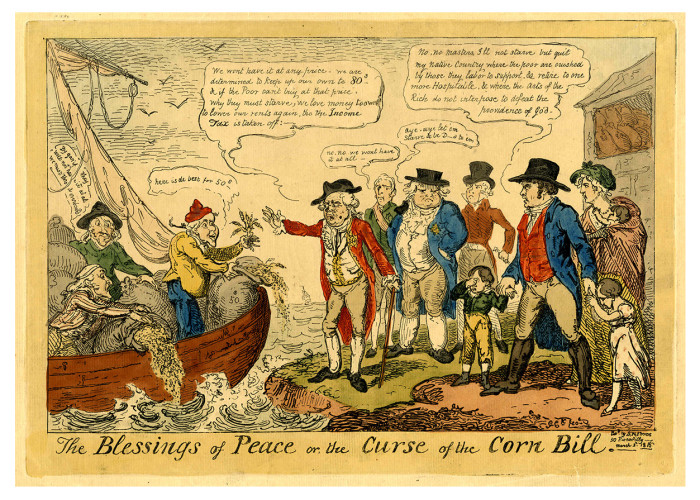The Blessings of Peace or the Curse of the Corn Law
Theme: The arts in the Age of Revolution, The impact of industry, Challenging law and order: British riots and reforms, Economic and technological revolution, Printing revolution, British politics in the Age of Revolution, Trade, tariffs and taxes
This satirical cartoon, by George Cruikshank, is a comment on what became known as the Corn Laws – one of the most unpopular pieces of legislation ever to be introduced by the British Government.
Between 1793 and 1815, Britain was at war with France, almost continually. During this time, British farming expanded and food prices were high. A key crop was grain – especially corn, used to make bread. With the end of the wars in 1815, Britain could start importing cheaper corn from the continent. Ordinary, working-class people were delighted at the prospect of food prices finally coming down. But this threatened the profits of British landowners, who owned the grain-producing farms.
The Government was dominated by the landowning classes who stood to lose money (ordinary people had no vote and could not become MPs at this time) and passed a series of laws which prevented grain being imported from abroad. This artificially raised the price of British grain, which was all very well for farmers and landowners, but disastrous for the low-paid working classes and urban populations who relied heavily on bread as the main part of their diets. There was public outrage. The injustice of the ‘Corn Laws’, as they became known, fuelled protests, riots, uprisings and new movements such as Chartism, which called for reforms to make the Government and voting more representative of workers.
This cartoon pokes fun at the Corn Laws, while delivering a strong message. In the centre are four men whose clothes and decorations identify them as wealthy landowners. They reject the cheap imported corn being offered by the French merchants in the boat at the left of the picture. This corn is being offered for only 50 shillings a sack, but the new law required that foreign corn could only be sold when the British price reached 80 shillings. The lack of logic is shown by the fact that the warehouse is full of 80 shilling corn that no-one can afford to buy, whilst the French merchants throw their good corn overboard as they have no market for it. The landowners express their lack of compassion for the poor who will starve as a result of the law. On the far right of the picture a figure is shown, along with his family, protesting against the effects of the Corn Bill and declaring that he will leave the country for one where the poor are not ‘crushed by those they labour to support’.
After protest both by opposing politicians and the workers, at a point of great shortages, the Corn Laws were finally repealed in 1846. Their removal was celebrated as a triumph for the idea of free trade, which became a hallmark of British economic policy.
Did you know..?
George Cruikshank provided the original illustrations for the famous book Oliver Twist. Later, Cruikshank published a letter in The Times newspaper claiming he had come up with most of the plot for the story.
Sources & acknowledgements
This object description and its related educational resources were researched and written by our team of historians and education specialists. For further information see the item’s home museum, gallery or archive, listed above.
- Related resources
-
Education overview
You can access a range of teachers resources related to this object and more on our education page.
Please also see our glossary of terms for more detailed explanations of the terms used.
-
Curatorial info
- Originating Museum: British Museum
- Accession Number: 1868,0612.1281
- Production Date: 1815
- Creator: George Cruikshank
- Material: Paper
- Size: 250 mm x 350 mm
- Original record
-
Use this image
You can download this image for personal and educational use but please take note of the license type and rights holder information.
- Rights Holder: British Museum
- License Type: All Rights Reserved
Find it here
This object is in the collection of British Museum



